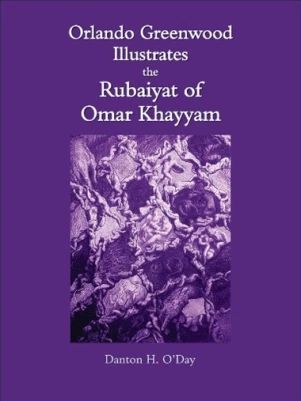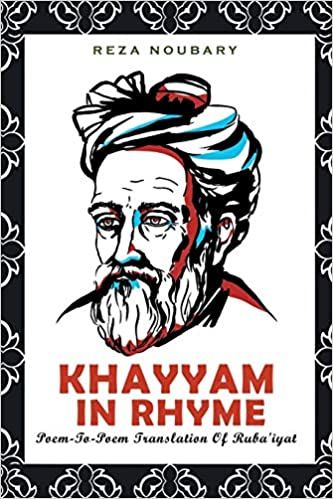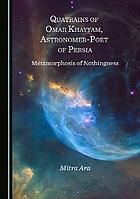Many items listed in Potter’s Bibliography have been online available for quite some years now. Most of these titles can be found and downloaded on the Archive.org website, in a variety of formats such as ePub, PDF, or Full text etcetera. Here we find the common and popular editions of the Rubáiyát, but also a considerable number of the more inconspicuous ones. One exeample that I came across recently is Potter’s number 389. It is listed as follows:

The twelve issues of volume 3 (1915) of the Islamic Review are all available at Archive.org, and in issue 4 (April) we find Potter’s reference on pages 194-195. First thing we notice is Potter’s misspelling of the name: Whymat in stead of Whymant. The full title of the section is

There are two verses from Jalal-Ud-Din Rumi, one from Sadi-Al-Shirazi and two from Omar Khayyam.
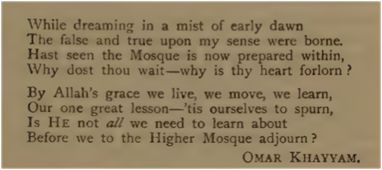
This section is followed by an article by Whymant, titled ‘The Philosophy of Yesterday’, quoting one quatrain from FitzGerald’s translation (“Come, fill the Cup …”)
As Potter mentions there are seven quatrains from the Ouseley and Calcutta MSS., in the October issue of the same year, in an article titled: ‘The Mysticism of the Ruba’iyat of Omar Khayyam’. It is a response to an article by C.E.H. Wann in the September issue, which itself is a reponse to an earlier article by Whymant, titled ‘The Psychology of the Persian (Mystic) Philosophers’, in the July issue. The discussion is about the question whether Omar was a Muslim, as Whymant argued.
As all these articles (see the hyperlinks below) are online available, the reader may decide for himself whose arguments hold ground. My intention is to merely draw attention to the quatrains and to give the complete text of the nine quatrains. It should be noted that for the first two quatrains no source is given, neither have I been able to trace a corresponding source in my quatrains database.
The quatrains
From: Islamic Review, April 1915:
While dreaming in a mist of early dawn
The false and true upon my sense were borne.
Hast seen the Mosque is now prepared within,
Why dost thou wait—why is thy heart forlorn?
By Allah’s grace we live, we move, we learn,
Our one great lesson—’tis ourselves to spurn,
Is HE not all we need to learn about
Before we to the Higher Mosque adjourn
From: Islamic Review, October 1915:
Let not grim sorrow thus embrace thee now,
Nor empty grief absorb thy days allow.
Leave not this book; the lover’s life enfold,
’Ere earth fold thee; the field’s green bank hold thou! [Ouseley. 76]
And for a time when young we spent a space
With masters, and were pleased with our slow pace,
But when the Doctors closed the discourse down,
Alas! Where were we? Whither gone our grace? [Ouseley. 121]
Behold, we neither know nor yet can guess
The Eternal Riddle, whether no or yes.
The Secret of Eternity still is hid,
Nor in our efforts can we find success, [Calc. 387]
And this thy secret—friend, O! guard it well,
Nor aught of it to friend or foeman tell,
The Tulips that thou seest wither’d there
Will ne’er rebloom—so much for Heaven and Hell. [Ouseley MS. 35]
Trav’lling far by vale, desert, and plain, ;
All through the world I went, but went in vain,
Nought have I heard of one returning thence,
Nor trav’lled once, is that road trod again. [Calcutta MS. 36]
The caravan of life has passed us by
In myst’ry; seize the moment passing by
In happiness, nor dream thou of the Dawn,
A cup of wine, boy! for the dawn is nigh. [Ouseley. 60]
Behold the wise engaged in splitting hairs
About existence, when quite unawares
They perish. Dunces, fools they be,
Choose grape-juice rather that a creed like theirs. [Ouseley. 50]
The issues
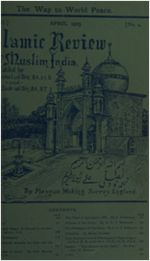 Islamic Review and Muslim India 1915-04: Vol 3 Iss 4: PDF
Islamic Review and Muslim India 1915-04: Vol 3 Iss 4: PDF
Islamic Review and Muslim India 1915-07: Vol 3 Iss 7: PDF
Islamic Review and Muslim India 1915-09: Vol 3 Iss 9: PDF
Islamic Review and Muslim India 1915-10: Vol 3 Iss 10: PDF
